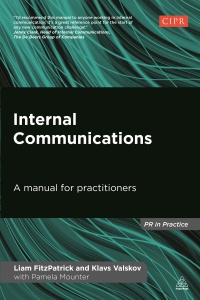As I have no practical experience of being an internal communicator, I decided to give Internal Communications by Fitzpatrick and Valskov a trial. It was great to learn how internal communications (IC) can affect staff turn-over, employee engagement and overall productivity of businesses. There are various types of internal communications depending on the organisation’s needs. One is the internal communicator in conjunction with HR would focus – amongst many – to reducing absenteeism and staff turn-over, whilst IC in combination with Marketing could mean aligning both the internal and external tone of voice of the business.
Moreover, Fitzpatrick and Valskov highlighted the importance of understanding the audience for a successful internal communications campaign, which I completely agree with. Most professionals within marketing, PR and various others, would say knowledge of the audience plays a critical role in choosing and executing the appropriate strategy.
Furthermore, as someone who is new to IC I’ve learned the basic functions of town halls, push and pull channels, and intranets for IC – these are content platforms and tools, which I have not used in my previous role. However, what I’ve discovered from reading the literature is compared to PR, a Public Relations personnel could control the amount of information they share with the media, whilst an Internal Communication professional would practise honesty and compassion – thus making IC a more complex and challenging role use to gain the trust of the audience.
Overall, I found the book very educating and helpful specially for my first role within IC, and would surely follow most of the advice given in the book. In addition, if there is one lesson I could not forget from it is the quote “The communicator who is not aware of the need to continually learn and develop is probably on an accelerating track to extinction“, which reminded me of one Marketing Director who I met – not by choice – and said ” I have no interest in social media” – implying it is somehow irrelevant.


You must be logged in to post a comment.